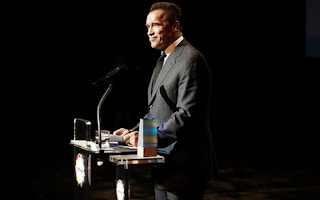What if everything the world needed for sustainable societies is already available? Former California Governor Arnold Schwarzenegger announced a new global award on Friday aimed at proving just that: most of what societies need for productive, eco-friendly lives exist today and are accessible.
At a ceremony attended by more than 1,000 guests at Copenhagen’s Royal Theater, Mr Schwarzenegger presented the first annual Sustainia Award to British Azuri Technologies for its Indigo solar energy system targeted at remote communities in developing countries.
He congratulated the winner – a spin-off from United Kingdom-based Eight19 solar technology firm – for “proving to the sceptics and the naysayers that solutions already exist to meet the challenges our planet’s environment is facing”.
“This award is about more than making the world sustainable - it’s also about improving the communities where we live,” he said.
The Indigo system makes solar energy affordable to off-grid communities, who have no access to a central electricity source, and eliminates the need for expensive up-front investments in solar equipment and electrical hook-ups.
Users pay for the system over an 18-month period by purchasing scratch cards such those used to top-up mobile phones worldwide. One scratch card provides enough solar energy to power two LED lights and a mobile phone charger for a week, and costs about half of what residents would otherwise spend on fuel for polluting kerosene lamps.
The 6,000 families in Kenya, Malawi, Zambia and South Sudan who already have the Indigo system, which uses thin-film solar technology first developed at Cambridge University, can expandit at the end of its pay-off period to get more power.
“We are thrilled to be the first winner of Sustainia Award. This award and the remarkable work associated with it will raise awareness of our technology and the great impact the solar panels have for people, whose only alternative is smoke-filled unhealthy kerosene,” said Azuri chief executive Simon Bransfield-Garth in a statement.
Over the next year, Sustainia and its partners will help the winnerpromote widespread adoption of the solution through investor match-making, media outreach and appearances at international conferences.
The winner also has the right to use the title ‘Nobel Sustainability supported Clean Tech company 2012’, a label granted only to those chosen by the charitable funding group Nobel Sustainability Trust of Nobel Peace Prize fame.
Founded by Danish think-tank Monday Morning, Sustainia is a global alliance of non-government organizations and corporate partners who have committed to accelerating solutions to sustainability problems.
Members include the UN Global Compact, Nobel Sustainability Trust, Arnold Schwarzenegger’s initiative Regions20, and multinationals such as Microsoft, GE, DNV, Philips Lighting, DONG Energy, Novo Nordisk, Tetra Pak, Cisco, Knoll, IKEA, Vestas, and UBS Investment Bank.
Each year, Sustainia showcases 100 solutions chosen by the Sustainia secretariat from online public recommendations. Sustainia staff, partners and consultants shortlist the top 10 solutions as nominees for the annual award, which is chosen by an award committee.
This year’s award committee included Honorary Chair Arnold Schwarzenegger, former Norway Prime Minister and former Director-General of the World Health Organization Gro Harlem Brundtland, UN Climate Panel chair Dr Rajendra Pachauri, European Commissioner of Climate Action Connie Hedegaard, and Nobel Sustainability Trust chairman Gustaf Nobel.
The current Sustainia100 includes solutions, which can be products, services or ideas, from 56 countries across the categories of buildings, food, fashion, transportation, IT, education, energy, health, cities and resources.
To make the list, solutions must be ready and available, scaleable, collaborative, transformative, cost effective, have a positive environmental impact, and increase quality of life.
One innovation out of the United Arab Emirates, for example, uses protective films in agricultural fields to reduce water demand by 50 to 90 per cent. It also increases yields in arid environments and reduces the need for fertilizers by up to 80 per cent over normal growing conditions.
The South Korean city of Seoul was nominated for its Design Seoul initiative to put the needs and input of citizens first in its urban design. The city set up a call centre so that citizens could share ideas and concerns about improving the environment, culture, liveability and public health. It has also transformed formerly grid-locked roads in its downtown area into usable community space.
Sustainia executive director Laura Storm told Eco-Business in an e-mail interview that existing, successful solutions such as these are what will transform societies, and therefore existing solutions are exactly what needs to be communicated.
“It is key to reach a critical mass of good examples that prove to industries and sectors that sustainable innovation is both available and competitive compared to traditional knowhow,” she said, adding that Sustainia has created an alliance of global partners to inform industries, executives, decision makers and ordinary citizens about the alternatives already available.
Mr Schwarzenegger said in a statement that the diversity of the 100 nominees showed that sustainable solutions are happening right now across different industries and regions of world.
“These solutions are transforming our homes, reshaping our cities, and bringing new ideas to entire communities. By sharing what is already working and pushing for new innovations, we will ensure sustainable growth and job growth at the same time,” he added.
This story was sponsored by Philips Lighting.









